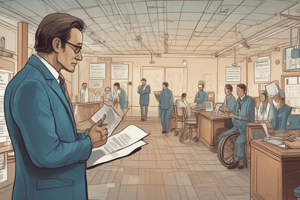Podcast
Questions and Answers
What is one of the main benefits of planning in an organization?
What is one of the main benefits of planning in an organization?
- Limits employee creativity
- Reduces risk of uncertainty (correct)
- Increases workload
- Creates chaos in operations
Planning is only necessary for the top management of an organization.
Planning is only necessary for the top management of an organization.
False (B)
What function of planning involves selecting the best options to achieve organizational goals?
What function of planning involves selecting the best options to achieve organizational goals?
Achieving Organizational Goals
Planning is __________ since it is ongoing and adapts to evolving needs.
Planning is __________ since it is ongoing and adapts to evolving needs.
Match the following planning functions with their descriptions:
Match the following planning functions with their descriptions:
Which of the following describes a strategy in planning?
Which of the following describes a strategy in planning?
Policies are specific statements that explain what must be done.
Policies are specific statements that explain what must be done.
What is the main purpose of following up action in planning?
What is the main purpose of following up action in planning?
A _____ outlines the specific steps established in advance to address future conditions.
A _____ outlines the specific steps established in advance to address future conditions.
Match each type of plan with its corresponding description:
Match each type of plan with its corresponding description:
What is the first step in the planning process?
What is the first step in the planning process?
Identifying premises refers to recognizing past events that influenced planning.
Identifying premises refers to recognizing past events that influenced planning.
What are the potential limitations of a rigid planning process?
What are the potential limitations of a rigid planning process?
The process of analyzing the potential pros and cons of each option is known as ________.
The process of analyzing the potential pros and cons of each option is known as ________.
Which of the following is NOT a step in the planning process?
Which of the following is NOT a step in the planning process?
Selecting an alternative means choosing the least effective course of action.
Selecting an alternative means choosing the least effective course of action.
Match the following planning concepts with their descriptions:
Match the following planning concepts with their descriptions:
Plans that are too ________ may struggle to adapt to changing circumstances.
Plans that are too ________ may struggle to adapt to changing circumstances.
Flashcards
Planning Provides Directions
Planning Provides Directions
Planning clarifies objectives, guiding employees towards goals. Without planning, work becomes chaotic.
Planning Reduces Uncertainty
Planning Reduces Uncertainty
Planning helps anticipate change and prepare for potential issues. Uncertainty can't be fully eliminated, but planning helps prepare for it.
Planning Reduces Overlapping Work
Planning Reduces Overlapping Work
Planning coordinates departmental efforts, reducing confusion and promoting smooth workflow.
Planning Fosters Innovation
Planning Fosters Innovation
Signup and view all the flashcards
Planning Involves Decision Making
Planning Involves Decision Making
Signup and view all the flashcards
What are Objectives?
What are Objectives?
Signup and view all the flashcards
What is Strategy?
What is Strategy?
Signup and view all the flashcards
What are Policies?
What are Policies?
Signup and view all the flashcards
What are Procedures?
What are Procedures?
Signup and view all the flashcards
What is a Budget?
What is a Budget?
Signup and view all the flashcards
What are Objectives in planning?
What are Objectives in planning?
Signup and view all the flashcards
What are Premises in planning?
What are Premises in planning?
Signup and view all the flashcards
What are Alternative Courses of Action?
What are Alternative Courses of Action?
Signup and view all the flashcards
What is Evaluating Alternatives?
What is Evaluating Alternatives?
Signup and view all the flashcards
What is Selecting an Alternative?
What is Selecting an Alternative?
Signup and view all the flashcards
What is Rigidity in planning?
What is Rigidity in planning?
Signup and view all the flashcards
What is Reduced Creativity in planning?
What is Reduced Creativity in planning?
Signup and view all the flashcards
What are High Costs in planning?
What are High Costs in planning?
Signup and view all the flashcards




